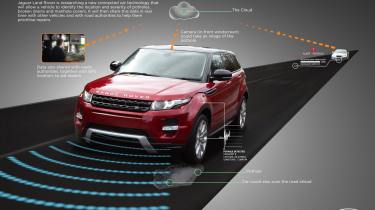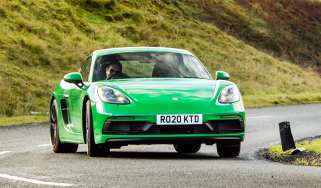Jaguar Land Rover helps to save tyres and alloys with pothole alert system
Research could help reduce the cost of punctured tyres and damaged wheels and suspension
They’re worst in winter but still unpleasant in summer – not supermarket food adverts, but potholes. And depending on their depth and shape, a misplaced wheel can cause huge damage to tyres, wheels and suspension.
Jaguar Land Rover has recently made headlines with its augmented reality windscreens and gesture control, but the firm’s latest research project, known as MagnaRide, could save drivers huge amounts of money by preventing such damage.
It’s part of Jaguar’s connected car technology programme. Using a vehicle-to-vehicle infrastructure, oncoming cars could automatically warn your own vehicle about poor road surfaces ahead – including potholes, broken drains and manhole covers.
Your own car could then act on that information, by either informing you that the surface ahead was damaged and allowing you time to slow down, or by adjusting the car’s suspension settings to reduce the impact of the bump. In the case of the latter, the extra pliancy could be just enough to absorb the impact, rather than letting the wheel and tyre take the brunt of the shock.
Currently, Jaguar Land Rover is testing an early version of MagnaRide on a Range Rover Evoque and Discovery Sport. Sensors read the road ahead to identify certain features, allowing the car to prepare the suspension.
‘While this gives our customers a more comfortable ride,’ explains Dr Mike Bell, Global Connected Car Director at JLR, ‘we think there is a huge opportunity to turn the information from these vehicle sensors into ‘big data’ and share it for the benefit of other road users.’
Mercedes-Benz already uses a similar system in the S-Cass known as Road Surface Scan, though the Mercedes system works by sensing the road itself using a stereo camera system to scan the road 15 metres ahead. While this allows some time for the suspension to adjust, it doesn’t have quite the advanced warning of JLR’s car-to-car communication.
At its most extreme – and moving towards autonomous car technology – the Jaguar Land Rover system could even guide a car around potholes and broken drains automatically (without leaving the lane and causing danger to other drivers), or by bringing the car to a halt in severe cases.
Another facet to the research is to use data collected by vehicles to assist councils in carrying out road repairs. JLR is working with Coventry City Council to understand how road profile information could be shared with road authorities, and to help determine what kind of information would be most useful.
There’s more to the research than just the off-road biased test vehicles however. With low profile tyres and large, intricate (expensive) alloy wheels, performance cars are perhaps more vulnerable than any other four-wheeled vehicle when it comes to broken road surfaces.




